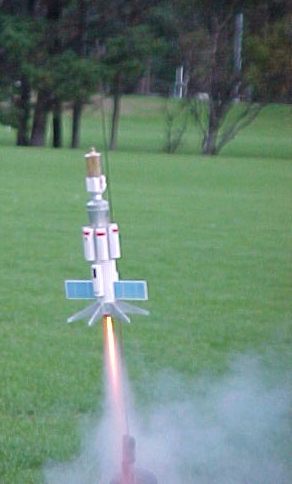| Construction Rating: | starstarstarstar_borderstar_border |
| Flight Rating: | starstarstarstar_borderstar_border |
| Overall Rating: | starstarstarstar_borderstar_border |
| Manufacturer: | Estes  |
 Brief:
Brief:
I chose this rocket because I was sick of all the "normal" looking
rockets. In New Zealand, only Quest and SOME Estes kits are available, and a
look through what was available in NZ made me realize that, on the most part,
they all looked the same. Then I came across this little beast! A very unusual
"rocket" indeed. Looks just like its full-sized counterpart, with
"solar panels", "fuel tanks" and a unique nose cone
assembly. Six (6) fins at the base of the satellite provide good stability to
this high-drag rocket, and six (6) "fuel" tubes make this rocket
stand out from the crowd! It is now the most popular rocket in my small local
rocket club and is a firm favorite of spectators.
Construction:
The heart of the kit is the unique molded nose cone, which is rather difficult
to describe, so check out the pic included with this review. With 10 cardboard
tubes in the kit, it pays to identify them a.s.a.p and mark them with a pencil.
Fins were well made.
This kit is not hard to make, but does require patience and attention to detail. With 6 fins and 6 "fuel" tanks having to be installed, it does get a bit tricky. But patience and attention to detail with result in one hot looking rocket! A word of warning and advise. Make sure you fillet the fin/body tube joints WELL, as they can be a bit fragile. Fuel cells are just over 2" long tubes, which are topped and tailed with cardboard discs. Two rectangular "solar panels" are installed on the body tube just above the fins. NOTE: When you mark the body tube as per the fin marking template included in the kit, make sure you write down in pencil on the body tube exactly WHAT each line/guide is for, as you need to draw 16 lines in all!
Finishing:
Paint the rocket as per the instructions, ie: white body, silver fins and nose
cone. I found when I coated the finished rocket with clear paint, the
chrome-painted parts dulled, which was a little disappointing. I HATE
water-slide decals! I see this as a major downfall. I thought water-slide
decals disappeared shortly after my youth, but obviously the need to make a few
cents extra by using cheap water-slide decals is all powerful.
Construction Rating: 3 out of 5
Flight:
The 18mm motors are retained by a Estes motor clip. After having a few problems
in the past with Quest motor clips breaking and bending, I found this
particular clip to be far superior. Well done, Estes! There is a lot of
parasitic drag on this rocket, and you really need to launch it on a C motor. I
prefer using a C6-3 for this baby, so that it looses as little altitude as
possible after apogee. With its low-speed take-off's, it REALLY does look
impressive, indeed! Max altitude is around 300feet.
Recovery:
I love Estes parachutes! Having been disappointed with Quest parachutes, it was
good to find a half-decent parachute from Estes. Standard Estes shock-cord
mounting is used. Do put an extra sheet of wadding in it. One of the downfalls
of this kit from a purely cosmetic aspect is the fact the the tops of the fuel
cells gets a bit "burned" by the ejection smoke. I have suffered fin
damage on more than half my flights, this is due to me launching it in
less-than-perfect weather conditions. If launched on a clear, fine day with no
wind, everything is fine.
Flight Rating: 3 out of 5
Summary:
If you want a rocket that is "different" and unusual, go for this
one. I don't know if the SDI Satellite is still in production, as we in New
Zealand are, alas, behind the times.
Overall Rating: 3 out of 5
Other Reviews
- Estes SDI Satellite By Frank Casey (March 30, 2008)
Brief: This is a single stage low power kit. It has a very unique appearance. Some people like the look while others think it's one of the ugliest rockets ever made. Construction: Parts List: Main body tube 8 Fuel tank tubes Nose cone Engine mount tube Launch lug Engine hook 2 Centering rings Die-cut balsa sheet Die-cut card (contains 16 ...
 |
 |
Flights
Sponsored Ads
 |
 |











